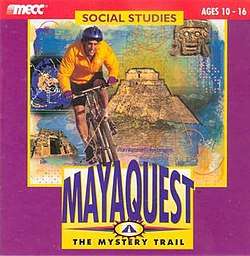MayaQuest: The Mystery Trail
| MayaQuest: The Mystery Trail | |
|---|---|
|
Macintosh Cover art | |
| Developer(s) | MECC |
| Publisher(s) | MECC |
| Producer(s) | Greg Holey |
| Series | The Oregon Trail |
| Platform(s) | Macintosh, Windows 3.x |
| Release | 1995 |
| Genre(s) | Educational |
| Mode(s) | Single-player |
MayaQuest: The Mystery Trail (also known as "MayaQuest Trail") is an educational computer game created by MECC and inspired by the actual MayaQuest Expedition.[1] It is a spin-off title The Oregon Trail series, featuring the lands of Mexico where the Mayan People once lived. While travelling across the lands by bicycle, the player learns all about the ancient culture and history of the indigenous people. The game also contains some Spanish language for additional learning.
Design
The game makes use of over 1,500 photos and videos that were taken during Dan Beuttner's expedition.[2]
Plot
For many years the Earth has been protected from incoming meteors by a space network. An incoming meteor in a satellite's path causes a shuttlecraft to be accidentally shot down to the Mexican jungles on Earth with only part of the new laser firing codes transmitted to the Meteor Defense Network. The player is sent to cycle through the jungles to find and recover the code pieces with a limited time before a meteor shower impact.
Gameplay
The game has two modes; The Adventure mode and the Explore mode. In the Adventure mode, the player has a limited number of days to find four code pieces for the Meteor Defense Network, before a meteor shower impact can occur. The player will receive objectives from the Mexican station commander and has to complete them as quick as possible. In the Explore Mode, travels around the Mayan ruins to answer the questions of interested contacts before the rainy season begins.
When travelling around Mexico, the player will cycle on a road to the chosen destination. The player must maneuver the bike in a 3D scrolling road environment without going off the edge and avoiding pot holes, logs and other obstacles along the way, otherwise the player gets an injury or breaks the bike. If the bike gets damaged, the player has the option to get it fixed for a price in one or two places, otherwise the player must walk which takes more time. If the player is injured, there options to rest (which takes up time) or continue in one or more ways.
In a destination, the player can move around by clicking the mouse pointer where it changes to an arrow icon. If the player finds something interesting, the pointer will change into a magnifying glass. The player can also use an overworld map of the destination to travel around quicker. In some places, the player will navigate in a maze-like area with a compass and a map for guides. The player also has the option to immediately escape from the maze.
Reception
| Reception | ||||||||
|---|---|---|---|---|---|---|---|---|
| ||||||||
According to surveys carried by Classroom Connect Inc. to over 165 educators around the USA, Mayaquest was highly praised for it's rich features, high curriculum value and notably the Spanish content for bilingual teaching.[5]
References
- ↑ Newton's Apple. "Maya Bike Trek". 3M Innovation. Retrieved June 9, 2017.
- ↑ "MayaQuest - MECC". February 25, 2015. Retrieved June 9, 2017.
- ↑ "MayaQuest: The Mystery Trail Review - Allgame". Allgame. Archived from the original on November 14, 2014. Retrieved June 9, 2017.
- ↑ Shmoe82 (December 15, 2007). "MayaQuest: The Mystery Trail Review - GameSpot". GameSpot. Retrieved June 11, 2017.
- ↑ Classroom Connect (June 18, 2001). "Classroom Connect's MayaQuest Wins High Marks From Educators". PRNewsWire. Retrieved June 9, 2017.
